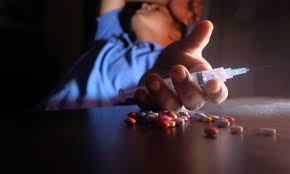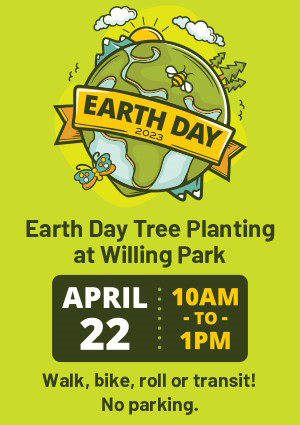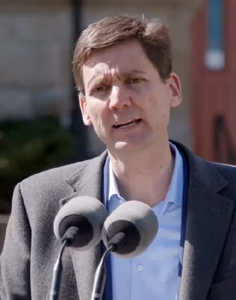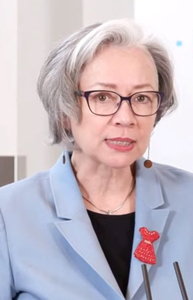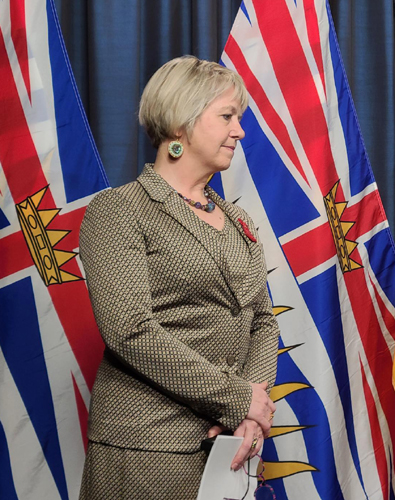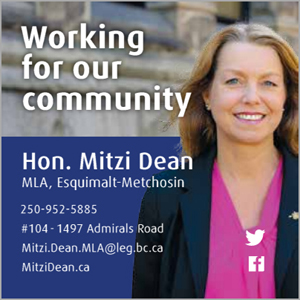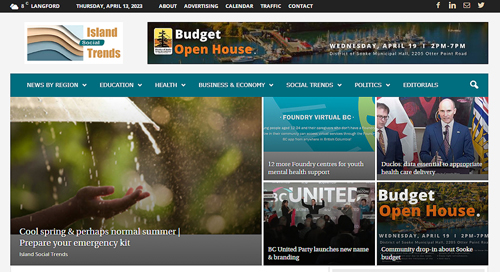Friday April 14, 2023 | LANGFORD, BC
Analysis by Mary P Brooke | Island Social Trends
Almost engulfed by the COVID-19 pandemic in 2020 and 2021, the toxic drug (aka opioid) public health emergency as first declared in 2016 has now deeply branded the psyche of the British Columbia population in more ways that they might realize.
By now, everyone knows someone or of someone who has died from a drug overdose — oftentimes not only unintentionally but also accidentally or through happenstance exposure.
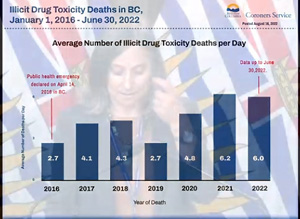
In the early years of tracking this tragic social health phenomenon the public view of it may have been these were ‘just drug users’ and oftentimes turned a blind eye.
But in the last year or two it’s become entirely clear that there are socioeconomic root causes to drug use, coupled with a criminal element of tainting and trafficking illicit drugs into and within BC.
In March 2022 the BC Coroner issued a report that could be summarized as needing to think outside the box with urgency.
Social and economic pressures:
The social and economic pressures to perform financially and to fit into a complex societal framework is part of the mix. The majority of deaths (over 80 percent, as reported in 2022) are seen in men in their 30s to 50s, and many of those in the construction trades.
Economic pressures apply across the board now — not just because of unrelenting inflation in the past 13 months but well before that due to the unattainability of housing and an adequate societal space to afford a family or a career. Those who have done well in the past 20 to 30 years have surged ahead, leaving many behind.
The despair of being a bad fit in society or being entirely left behind socially or economically has seen people turn not only to alcohol but to drugs.
The gap between the ‘haves’ and the ‘havenots’ in BC society has deeply widened on social, economic and political levels.
The BC approach:
BC has been approaching the crisis as a mental health and addictions problem, as well as blaming the criminal element that produces an increasingly toxic drug supply.
The health-care system has increased the number of mental health and addiction treatment options (safe injection sites, rehabilitation beds, etc) and has pushed for (and recently achieved) decriminalization of possession of small amounts of illicit drugs.
Now there is a shift to dealing with the core pieces of government directions that will deal with root causes such as overall life affordability, housing availability, housing affordability, and family-sustaining job availability.
Recognizing root causes:
One of the oddities of the last few years of the drug overdose crisis is a recognition — if not tolerance — of recreational drug use as something of an acceptable norm in society. And in the last few years an entire arm (or army) of health care resources have now had to be turned to and applied to this crisis.
Health-care attention to mental health and addictions is necessary and admirable, and in BC seems to be rolling out in ways that provide leadership for the rest of Canada.
But getting to the root causes of societal problems like poverty, lack of housing, and impediments to acquiring the right training or education for future jobs is the longer road to success. BC is also addressing these challenges now in various ways — acknowledging that prevention is the best strategy, but with a long way to go.
Today the Premier’s office issued a joint statement (along with Jennifer Whiteside, Minister of Mental Health and Addictions; and Dr. Bonnie Henry, provincial health officer) on the seven-year anniversary of toxic drug-related overdoses being declared a public-health emergency in British Columbia.
Joint statement on seven-year anniversary of toxic drug public-health emergency
VICTORIA – Premier David Eby; Jennifer Whiteside, Minister of Mental Health and Addictions; and Dr. Bonnie Henry, provincial health officer, have issued the following statement on the seven-year anniversary of toxic drug-related overdoses being declared a public-health emergency in British Columbia:
“Today, with heavy hearts and deep grief, we mark the seventh anniversary of the province’s public-health emergency in response to the toxic drug crisis. We mourn with each and every British Columbian who has lost a loved one, family member or friend to this crisis. Each loss is devasting to our communities. No words can ease the pain of those left behind by loved ones after their lives were cut short by the poisoned drug supply.
“Today, we deepen our resolve to save lives and improve lives, even as the COVID-19 pandemic’s impacts have made the drug supply even more toxic for people in our province. Budget 2023’s historic $1 billion in targeted investments will continue this work and will focus on scaling up detox, treatment and recovery services across the full spectrum of care, so people can find and stay connected to vital supports on their wellness journey.
“This resolve is also why we’re focusing on finding ways to act early to support young people at risk, like expanding supports into their communities through new Foundry centres. These centres provide people between the ages of 12 and 24 and their families with mental-health and wellness supports in their own communities. Early intervention and prevention can stop small problems from becoming bigger down the road.
“Our efforts, along with those of so many partners in community, also recognize that there are many underlying causes that lead people to use drugs, including the ongoing effects of colonialism and intergenerational trauma, poverty and homelessness.
“Prevention is a key strategy. That’s why we will continue our work to ensure all British Columbians have a decent home, food security and crisis supports of all kinds to get them through difficult times.
“We know there is much more to do. We extend our heartfelt thanks to all front-line workers and peers who make heroic efforts every single day to support those in distress and crisis.
“Our goal is to always be there with the support and care people need, when they need it to save lives and change lives for the better. This work takes all of us, together, and it’s more important now than ever.”
===== GOVERNMENT LINKS:
Overdose and Drug Poisoning Data (BC Emergency Health Services)
Escalating BC’s response to the overdose emergency (Report/PDF – approx 2018)
Opioid Overdose Emergency Snapshot in BC (Report/PDF – BC Centre for Disease Control – approx 2018)
Provincial health officer declares public health emergency (April 14, 2016)
===== RELATED ARTICLES:
BC decriminalization of possession of small amounts of drugs produces calls for better mental health and addiction supports (February 2, 2023)
Compassionate leadership expected to help as drug toxicity deaths rise (August 16, 2022)
BC drug crisis: time to think outside the box with urgency (March 9, 2022)
BC Coroners panel calls for safer drug supply, continuum of care (March 9, 2022)
Worker drug-poisoning prevention led by Vancouver Island construction industry (January 13, 2022)
===== ABOUT THE WRITER & ISLAND SOCIAL TRENDS:
Mary P Brooke is the editor and publisher of Island Social Trends as published daily at islandsocialtrends.ca.
She has been covering politics, business, education and communities through a socioeconomic lens since 2008 on south Vancouver Island (previously as West Shore Voice News, and before that both Sooke Voice News and MapleLine Magazine).
Ms Brooke followed and wrote extensively about the COVID pandemic during 2020-2022, and continues to follow the topic as new developments arise. She has covered Sooke School District 62 (SD62) in depth since 2014. Mary P Brooke reports with the BC Legislative Press Gallery.
Among other qualifications, Ms Brooke holds a health sciences B.Sc., a university Certificate in Public Relations, and an industry certificate in digital marketing. In the 1990s she was a cofounder of the Professional Editors Association of Vancouver Island and wrote the curriculum for the Writing for Business and Journalism Program in Victoria, BC.


